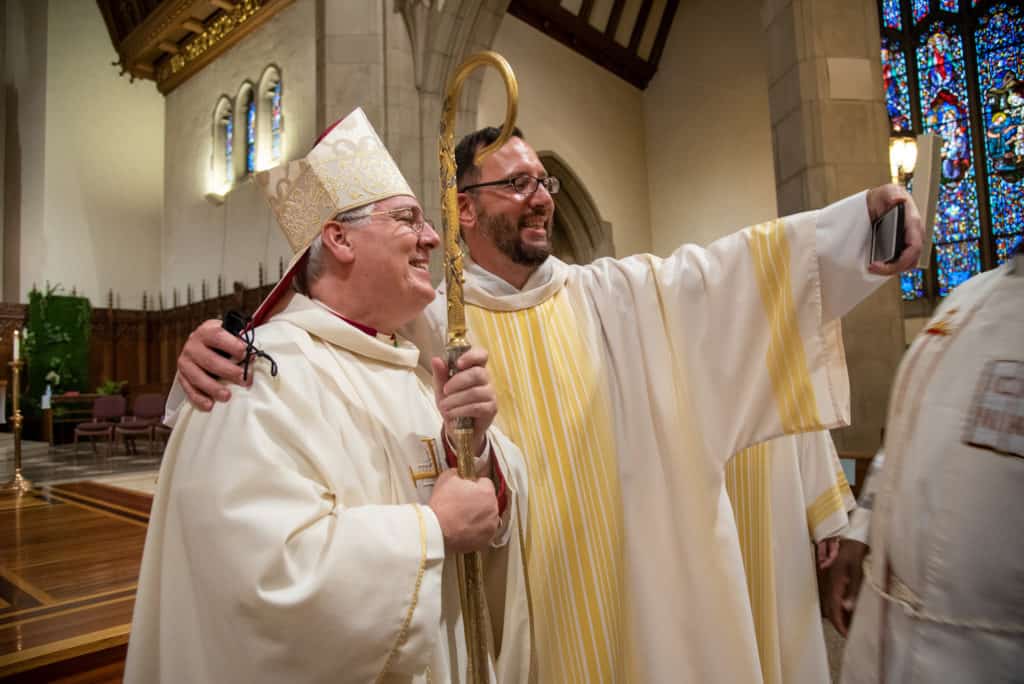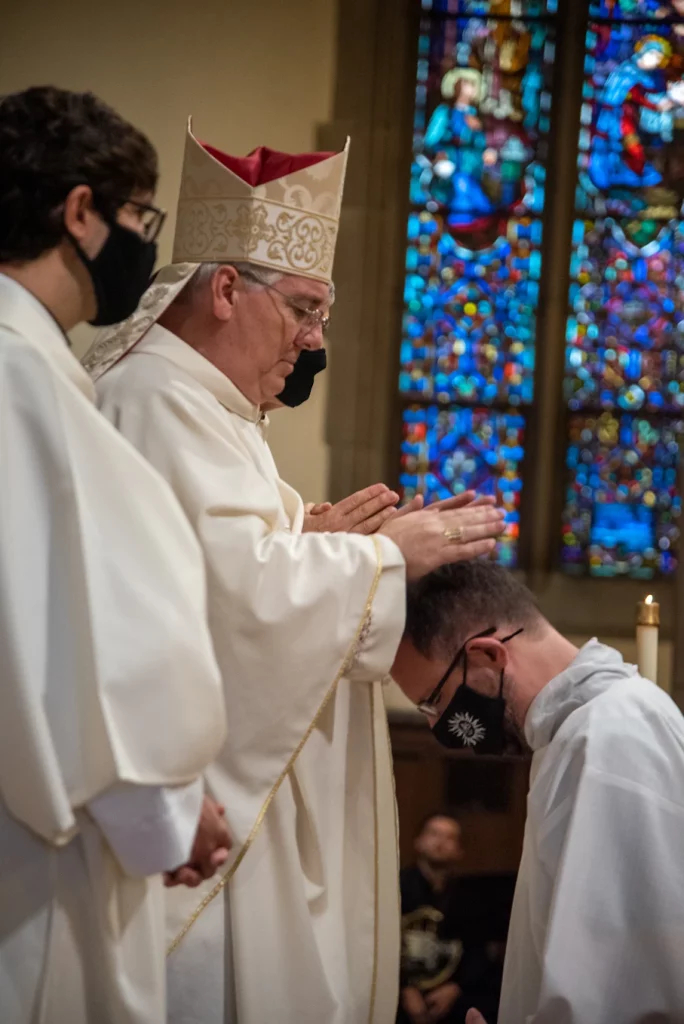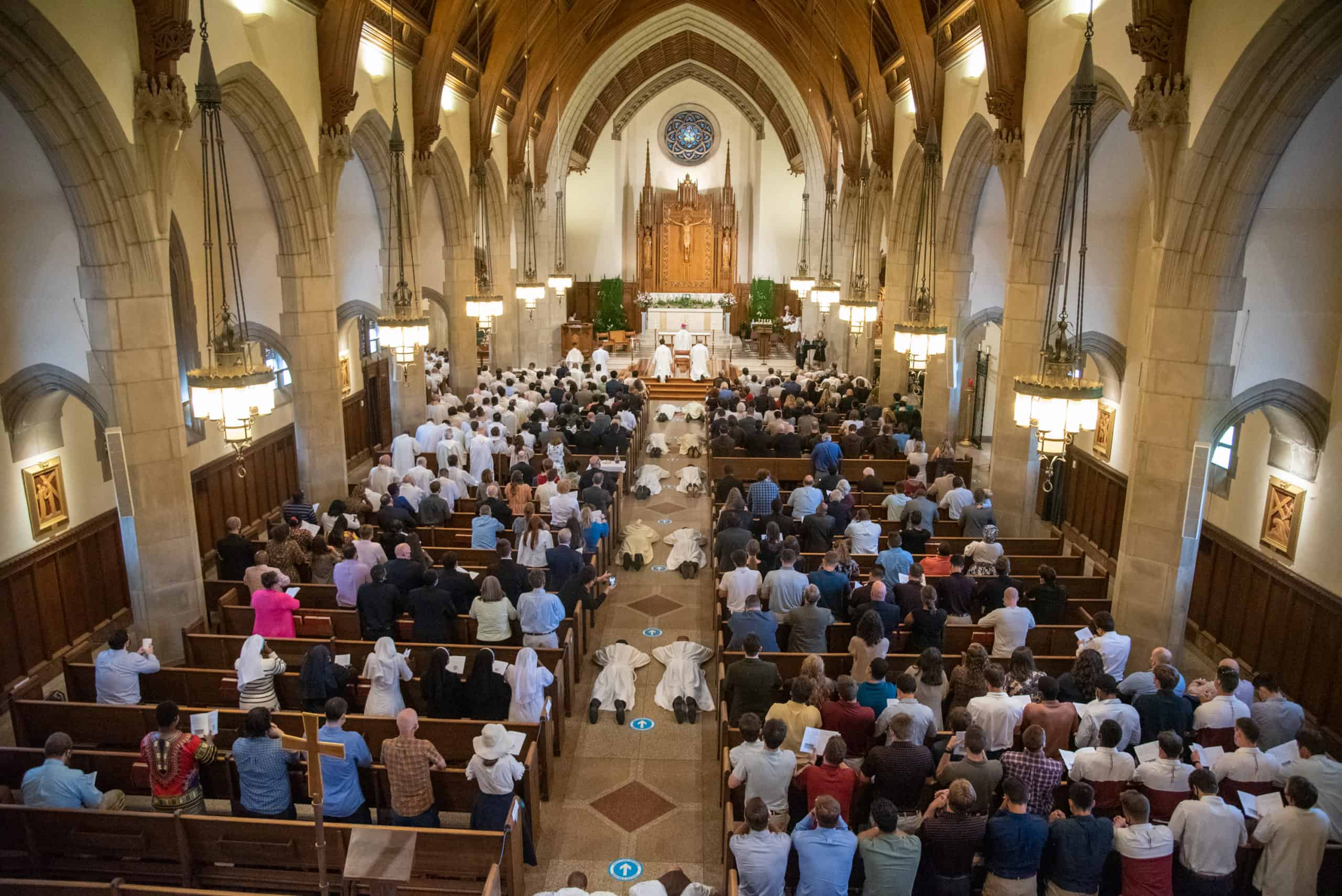This is the second installment of A Deacon’s Diary. The first installment described life as an “almost deacon.”
I.
On the Thursday night after ordination, I met up with a very good friend. We were seated outside, on the patio of a bar. In the middle of our usual catch up, he said, interrupting himself:
What did your ordination feel like?
My friend, also a Jesuit, had been there, in Saint Ignatius, Chestnut Hill the morning I became a deacon.
I was silent for a few moments. My friend looked at me intently. He wasn’t going to let me off the hook.
II.
The night before my ordination to the (transitional) diaconate, I split a pizza with two of my Jesuit friends, Guz and Grant. They’d traveled for the occasion, as had Greg. We were in their AirBnB, which Guz began referring to as an “Air B” (since there was no breakfast).
We sat around and watched Chapelwaite. It was an ordinary Friday night for me—usually in my house, we’d gather for pizza with Jesuits from other houses, and then watch a horror movie.
Maybe the difference was that on that particular Friday evening, I wanted a quiet night. So we chatted about priesthood and ministry while comparing notes on pizzerias and Stephen King adaptations. I went back to my house early, just after 9 pm. I had ironing to do and wanted to make sure everything was in order.
III.
I starched and ironed an amice, a garment that covers a clerical collar underneath an alb. It’s a large, rectangular piece of linen with long, unwieldy ties that crisscross one’s torso.
I ironed my alb, the white robe that would go over my clothes, but under the other vestments I would receive in the morning.
I ironed two clerical shirts. One for Saturday. And one for “first” Masses at Boston University’s Catholic Chaplaincy on Sunday.
I thought about a short story I’d remembered from a literature class (‘I Stand Here Ironing’ by Tillie Olsen) about a woman who tells her story and troubles while ironing clothes. I wondered if I should be more stressed about the ordination, and if I had been, maybe the ironing would’ve been more therapeutic.
Every morning that week, I woke up and thought it was Saturday and I’d rush to start getting ready. And then realize it wasn’t yet Saturday. And in the week and a half since ordination, I still wake up most mornings and think it’s ordination morning. It’s a strange time loop of not-yet and already.
The ironing was calming, and I managed not to scorch anything that was white or linen.
IV.
Everything was hung up and arranged so I couldn’t forget things in the morning. Six o’clock came early and I got ready and drove to the church with a brother.
I vested almost immediately and then sat in the lower church for some silence. But I was waiting for a few people, to make sure they arrived—my mom, my aunt, a friend who traveled with them, a few other friends. A Benedictine monk. A neuroscientist from Harvard. A college friend I hadn’t seen in more than fifteen years. A newly-vowed Jesuit whose spiritual director I had once been.
I would pray for a while and then drift up to the upper church to see if people had arrived.
Eventually, I found myself among the crowd of concelebrants—deacons and priests who had vested to process with us and join in the liturgy. I chatted with my older brother-types in religious life–Guz, Grant, and Greg.
 I teased our ordaining bishop, Mark, that I’d never seen him so formal. He got me back a bit and roasted me by name during the homily, commenting that we shouldn’t just import our late-night insights while reading Karl Rahner into our homilies.
I teased our ordaining bishop, Mark, that I’d never seen him so formal. He got me back a bit and roasted me by name during the homily, commenting that we shouldn’t just import our late-night insights while reading Karl Rahner into our homilies.
I was reminded that it’s dangerous to be friends with bishops.
Then it was time for the procession. As we stood outside, one classmate remarked in mock-shock that he’d never seen me in shoes before. Another joked that he had an Uber waiting, in case of any last-minute changes of heart. It was joyous, but nerves were showing a little bit.
V.
My ribs hurt. After making a series of promises to be obedient, and celibate, and to conform our lives to Christ, the twelve of us lay on the floor of the aisle of the church. We’d practiced everything for a few hours the Thursday prior—kneeling and standing and prostrating.
But my ribs hurt. The floor was hard and made of terrazzo. I was overwhelmed. Lying face down, I began to sing along with the congregation. They asked the saints and angels to pray with us. We asked God to bless us and be merciful.
Earlier in the week, my confessor had said to me: When you lay down on the floor and get up again on Saturday, you’ll carry all the same people, all the same things as you approach the altar. The question is: ‘how do you carry them?’
I got up and knelt before the bishop. He laid hands on my head, an ancient sign used by the early Church.
My friends, my brothers–Guz, Grant, and Greg–vested me in the deacon’s diagonal stole and dalmatic—a kind of tunic. Vesting priests at ordination are important relationships, often mentors. In my case, older brothers who’d seen me through a lot. Earlier, they’d laughed loudly as the bishop roasted me. Now, they were both serious about what they were doing and teasing all at the same time.
Here, put this on. But kiss it first. One said, as he held the stole for me to kiss and then put it on me.
Which way does it go? I asked. From left to right. He explained.
The other two, entrusted with the dalmatic, joshed: We thought about putting it on you backwards.
One directed: Hold out your arms. I held them out in a cross-shape. And he checked that all of the layers of cloth were arranged well.
They each embraced me. And I thanked them. For vesting me. But more for our brotherhood and their company.
One of my teachers, Cathy, who had proclaimed one of the readings, happened to be sitting in the front row and we shook hands—the kind of two-handed handshake that’s joyful and robust.
VI.
The rest of the liturgy proceeded more or less as usual. There was a celebratory luncheon after and various people from different parts of my life mixed and mingled. I appreciated all of them being there, but couldn’t spend enough time with every person. That would be hours of conversation with each of them. Slowly, the afternoon passed and people trickled home.
The other Jesuits in my house graciously cooked dinner for my family and a few guests. And we had a relaxed dinner. I’ve enjoyed and valued occasions when my mom and aunt can meet other Jesuits and see what our life is like. My aunt always introduces herself as my “favorite aunt.”
All throughout people asked me if I felt different. I’d quip when people asked about “ontological change.” I thought I was theologically clever when I replied that I understood that the action of the ordination on Saturday was part of an entire movement that would culminate on Sunday, when I assisted with the liturgy and the proclaiming of the gospel. It was a very theological way of saying: I’m not sure.
VII.
My friend looked intently. He was still waiting for an answer, sitting quietly after he’d interrupted himself and stopped telling his story. The music from the bar was enough to dampen the silence.
He looked tired—exhausted, in fact. It had been a long week. Stifling a yawn, he waited. The question hung between us:
What did your ordination feel like?
I’m not sure. I said. I felt a lot of things. And I was overwhelmed. I sang as I lay on the floor for the prostration during the Litany of the Saints. I was surprised.
VIII.
My friend had been there on Sunday morning for the first Mass at Boston University. He walked in a bit into the homily, as the T had been delayed that morning on account of construction. He was a good and persistent friend.
Not sure why, but interiorly, I felt the same way as when I was back and forth checking if family had arrived on Saturday morning. I settled down once I saw him sit down in a pew, mid-way down BU’s Marsh Chapel.
On the altar, I tried to remember everything from my rites course the spring before—I’d been rereading parts of the missal that morning.
We didn’t get everything right at the first Mass. The second time around, I think we did everything correctly. I needed more practice. Neither Fr. Kevin—BU’s Catholic Chaplain—nor I were used to my being a deacon.
IX.
 I’m not sure what it felt like, I said, trying to answer the question still.
I’m not sure what it felt like, I said, trying to answer the question still.
He said, Did you feel anything when the bishop put his hands on your head? Or when he passed you the book of the gospels?
I don’t think so, I said. Nothing very strong. Those were key moments, but they were just woven into a whole for me. The whole of it was an experience that flowed, full of overwhelm and feelings everywhere. All of it felt like something sacred. But I’m not sure what it felt like. And that continued on Sunday.
I wondered if he thought I looked different as I was in the sanctuary at Marsh. Eventually, I thought I felt ever so slightly different. But I’m still not sure what it was. I’m grateful for friends who ask. And listen patiently, intently as I grapple to describe it all, a reality hiding underneath my elegant-sounding theologies.
In the next installment of A Deacon’s Diary, Steve looks for his voice, or maybe God’s.


